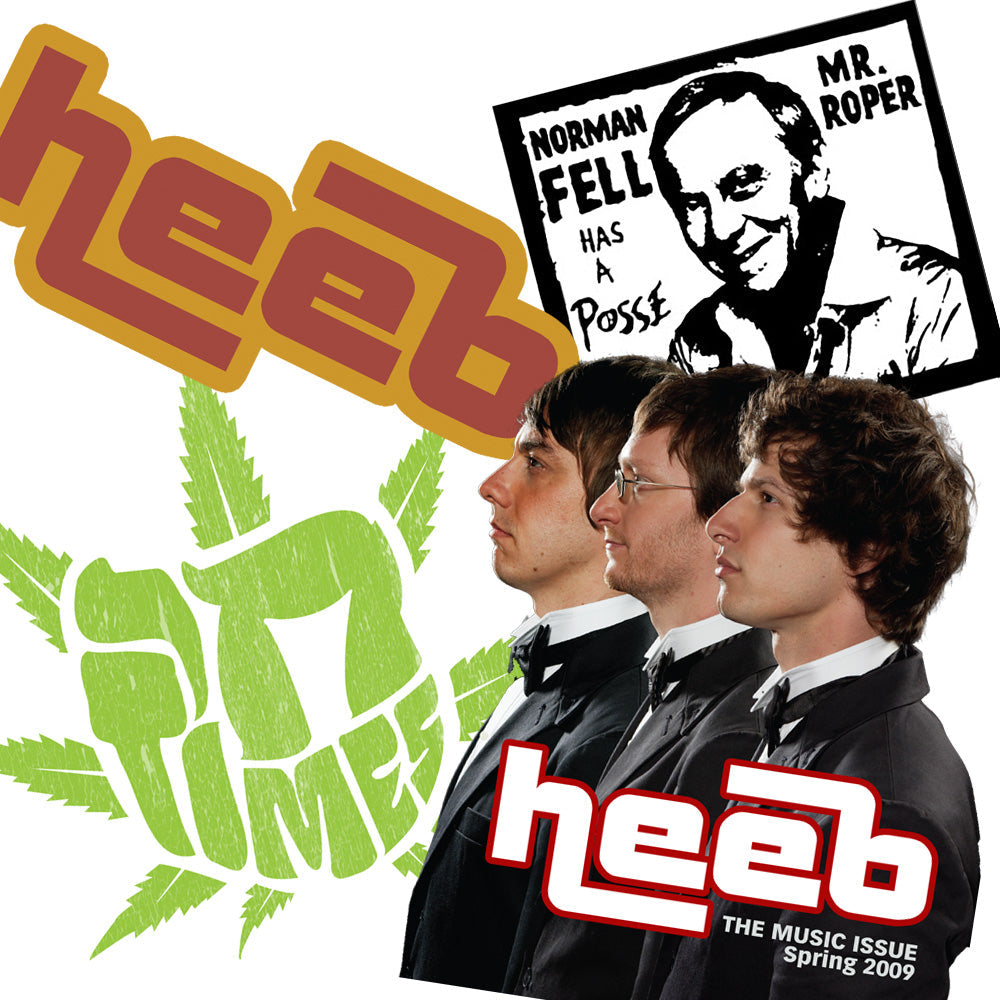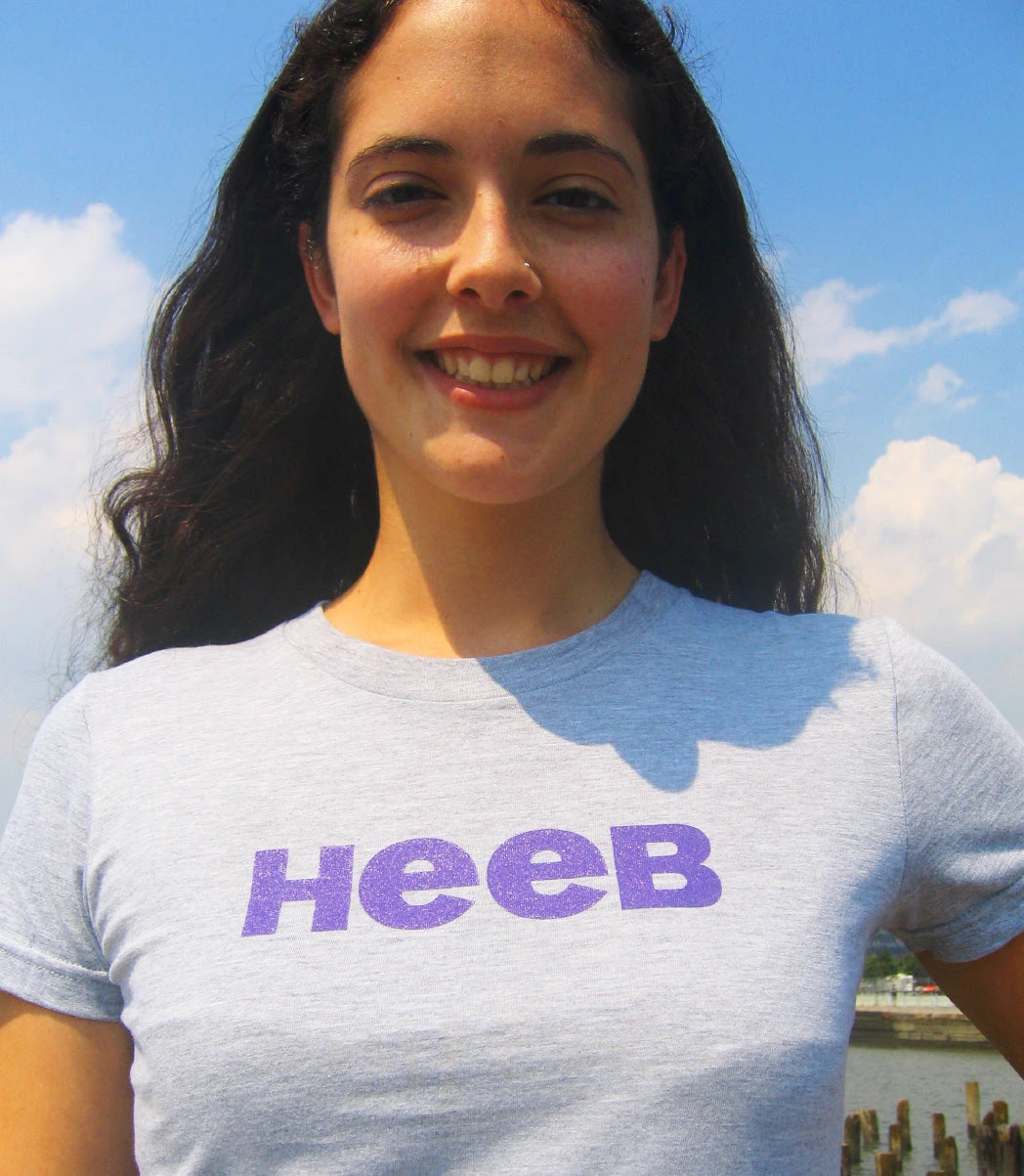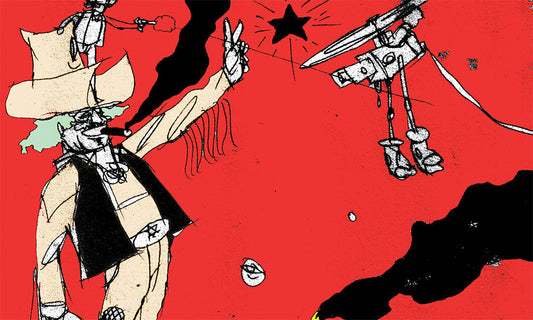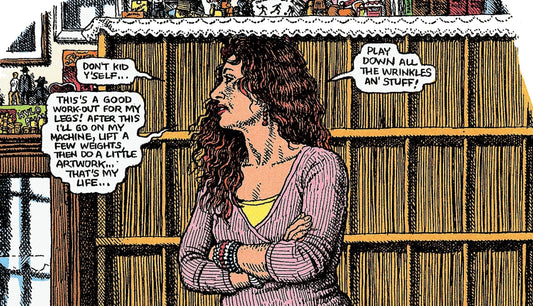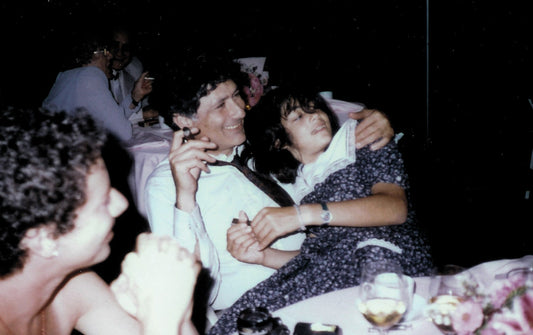Natasha Lyonne's Sweet Comeback
Text by Shira Levine
Images by Noah Sheldon
Special thanks to Sympathy for the Kettle
This article was originally published in HEEB #19, Winter 2008
I almost don’t recognize Natasha Lyonne when she walks into SoHo’s Circa Tabac. Fifteen minutes late, she zooms right past me and I have to guess, “Natasha?” before she turns. “Shira!” she replies, like we’re old friends, or maybe new ones. It’s the blownout hair that threw me. “There’s still a little curl to it. It’s not straight. It’s just not natural. Look, this is what happens to you when you get involved with drugs,” she jokes. “Chloë [Sevigny] hates it when I wear it straight. She’s always like, ‘Where’s those big beautiful curls?’” Sporting dark-rimmed Buddy Holly glasses, bundled in a gray pea coat, Lyonne looks like any pretty, thin New Yorker rushing to be somewhere.
But who is Natasha Lyonne? In 1999, she was Teen Angst. The voice of the awkward and intellectually sarcastic Jewish kid. Beetlejuice/Heathersera Winona Ryder with an extra dose of self-deprecation. Everyone knew her as Jessica in American Pie, the girl who advised “virginal” Tara Reid to just get laid already (“It’s not a space shuttle launch; it’s sex.”). But it was Vivian in Slums of Beverly Hills and poor, repressed Megan in But I’m a Cheerleader that made the cool kids love her. She was smarts, insecurity, alienation and sometimes tits, all wrapped in a 5 foot 3 inch package. And then came drugs, arrests, hospitals and that infamous mug shot. Now cleaned up, years later, is she still the same Natasha?
We’re at one of the city’s last remaining smoking bars because cigarettes are her last remaining vice (she brought two packs and shared), and this is pretty much her first interview since her publicly chronicled downward spiral. The New York Times ran an interview that touched on her recovery, but now sober for almost three years, she’s in an even better place. Unfortunately, Circa Tabac doesn’t serve coffee, so it’s bottled water and edamame for us. “Maybe we’ll go on a bender together, Shira. Maybe it’s time to have a few drinks again,” she teases in her naturally husky voice, tempered by almost two decades of Marlboros. She has a tough girl Brooklyn accent. When she goes off on a comic riff, it’s like she’s channeling Joe Pesci mixed with Woody Allen, who incidentally directed her first “grownup” role: the narrator part in Everyone Says I Love You.
“I was 16 years old. It was my rite of passage,” she says, and I ask her if she’d work for the legend again. “I don’t know, if he calls maybe. I was the biggest 16year-old brat. I would slam my trailer door and put a sign on the outside that said ‘Do Not Enter.’ It said ‘Keep Out! And that means you, Woody!’ And then I’d blare my Led Zeppelin really loud and smoke lots of cigarettes. And then I’d come to the set and scream ‘Screw you, mom!’ No, it wasn’t exactly like that, but you get the picture. I’m just kidding.”
A lot of Lyonne’s stories end that way—with a clarification. ‘I’m exaggerating. Just a joke.’ And this is necessary. Past confusion has caused problems.
By the time she’d completed the commercially successful American Pie, she was running with the wrong crowd, partying hard in New York, and hooking up with bad boy Eddie Furlong of Terminator fame, her costar in Detroit Rock City. Miami Beach police arrested her in 2001 after she hit a road sign and attempted to flee the scene. After nixing the Breathalyzer test, she sarcastically told an officer “I’m a movie star. Can I talk to my entertainment lawyer?” The media had a great time with that one. The Smoking Gun named it “The Most Entertaining Celebrity Arrest Report” of 2001. “Listen, I’m not for everyone. Maybe those officers didn’t understand that I was kidding,” Lyonne explains. “Maybe a lot of those people who wrote up those police reports thought I was being serious. They probably don’t have my same sense of humor. It’s not like they have a Petri dish of highbrow comedy over at the precinct.”
Now, in 2008, she’s in the “Hallmark Hall of Fame” presentation of Loving Leah with Six Feet Under’s Lauren Ambrose, a quirky love story revolving around the wedding and unconventional married life of a 26year-old widow and her late husband’s brother. Susie Essman of Curb Your Enthusiasm, Ricki Lake and Mercedes Ruehl round out the cast. As of November, she was filming Thirteen starring Mickey Rourke and 50 Cent. Plus, she’s got those funky independents: comedies about janitors being experimented upon, with tag lines like “still wondering why your life didn’t turn out like a John Hughes movie?” There’s Goyband (think Dirty Dancing meets My Big Fat Greek Wedding) with super-bubbe Tovah Feldshuh. (“I guess it does get Jewier than me!” she says.) And there’s one just titled Heterosexuals, in which she costars with. . . Tovah Feldshuh again! (“She’s extraordinary,” raves Feldshuh. “She is creative and she is free, and most importantly, you believe her.”) Sure, the new films could fizzle, but, hey, one could also become her next breakout. With the right dialogue, the right scene, Lyonne might recapture everyone’s attention. Think of that scene in Slums when her father (played by Alan Arkin) coached her as she tried on her first “braziere.” Yes, working with Ricki Lake isn’t the same as working with acting royalty like Arkin, Alan Alda, Carl Reiner, or Goldie Hawn. But, the once indie darling has a plan: “I want a career like John Turturro!” Around 2000, she was almost there. Stranger things have happened.
Just consider where Lyonne was three years ago—reportedly homeless after actor Michael Rapaport evicted her from his East 18th St. building. In a scathing essay for Jane magazine, Rapaport publicly bitched her out for the way she treated the place: “It looked like a grenade had gone off.” When she was arrested in 2004, it got worse. This time, it came out that she threatened to sexually molest her neighbor’s dog. No surprise reporters went nuts with that little sound bite.

“They were missing the point a bit when I said I was going to molest a dog. Is it my problem in the first place for being fucked up and acting like a maniac? Clearly. But should you steer your puppy in the opposite direction on the street when you’re walking by me? No! I love puppies as much as the next guy.” Unable to resist, she adds, “The only difference is what I like to do to them.” This is one of those points where Lyonne’s laughter escalates and a coughing fit ensues.“I fucking love animals. They’re delicious! Just kidding.”
Lyonne might have lost herself with drugs, lost a roof over her head, lost her sanity, but she never lost her sense of humor. “I mean the idea that this has become part of my story is really absurd to me. As a rule people don’t think other people on drugs are funny. They think they are tragic. They have a point, but I still had the funny.”
She knows she’s being outrageous, and it has me laughing hard. Being with Lyonne is like finding yourself in an inappropriate commentary contest that she’s bound to win. Keeping the funny going strong, Lyonne teases our server when he hands us the check.
“She’s not coming home with me,” she whines while he clears away plates. “I pulled out all the stops, you know? I did everything I could do. I did everything a girl could do,” she sighs. “I do appreciate your soft ear though. And I hate women. Actually, I don’t as much anymore. We should all just come together as John Lennon once said. Oh Shira, Shira the song. Is that what they call you? Shira the song? That’s what I want to call you if you let me. That’s what I’d call you every morning and every night. I’ll be like, ‘Shira, I’m naked. What are you doing?’” “I can’t keep track of what is funny and what isn’t with you anymore,” I tell her between giggles.
“Welcome to my world. I thought heroin was hilarious,” she mumbles, squirming in her seat. Lyonne squirms and spins around in her seat a lot. Maybe it’s a post-drugs, lingering behavior, or maybe the topic is understandably uncomfortable to discuss with a perfect stranger. It sucks living your life on display, and Lyonne had to take the most difficult route to figure that one out.
“I tell them I was in the army intelligence division. What if that was where I was for the last two years? I was undercover in the fucking Israeli army! That’s the real story about me. The whole drug thing was a front. How do you think we caught that Saddam Hussein? This guy!” she points to herself. “What do you have to say about that now about where my career went!? I say it’s time to say thanks!”
We spend the early evening chatting and giggling like old friends. Bonding over our curly hair, talking about our breast sizes. She’s masterful at stretching a joke so far it becomes funny again, and when she laughs, it’s contagious. At the end of the three hours, I want to be Lyonne’s new best friend. Unfortunately for me, actress Chloë Sevigny has already nabbed that spot. (“Chloë is a great fucking friend,” she says, serious for just a moment.)
“I love how I have what is probably early-onset emphysema. I’ll catch all the diseases out there! They’re for free!” She’s only partially kidding here. After those years of drugging and boozing, she ultimately ended up not only in the slammer, but also in Bellevue Hospital and later transferred, under a pseudonym, to Beth Israel Medical Center. Things are real bad when “citizen journalists” are blogging about your whereabouts and reporting (correctly) that you have a collapsed lung, heart infection and Hepatitis C. “I was 70 pounds,” she reveals, and when she sees my shocked expression, she corrects herself. “OK, I was 75 pounds. I was exaggerating.”
Now, three years sober, Lyonne’s much healthier, but do not get her started on the word “comeback.”
“That is strictly comedy to me. Saying the word comeback is hilarious,” she explains. Even though it’s really why we’re here, it isn’t Lyonne’s nature to “sell” herself; and she really doesn’t like that c-word. “‘And then Natasha Lyonne set out on her comeback trail,’” she says in some old time movie voice, like a sassy Shelley Winters, over the hill. “‘Yeah! I’m makin a comeback, kid! Stay outta my way! Now that I’m out of the pokey, I’m gonna make it big! Watch out gals, here I come!’” she booms. “That is total comedy to me. Like I’m fucking Gypsy Rose. That is not how I see my life.” “I love the image of me sitting by my vanity all day applying lipstick and chain smoking thin cigarettes like 120s, and reapplying my fucking Lee press-on nails and flat ironing my hair, listening to fucking Lena Horne singing the blues and exclaiming, ‘We Can Make It!’” Her comeback fantasy actually sounds pretty fab, but to a woman with over 20 years in show business, it’s clearly high camp. “Then when I like to take it down a notch I put on my jeans and a flannel and eat some brown rice and steamed veggies. Basically this is how it is, I’m a fucking actress and this is what we do.”
Not quite. I’ve interviewed actresses before. They smile, struggle to charm, remember not to offend. They shamelessly self-promote and talk about what an honor it is to work with suchandsuch, but Lyonne’s a different breed.
In the very nicest way possible, she tells me, “It’s not my job to be an appealing famous person for you,” as she takes out a cigarette. She takes her time, holding it unlit. It took her 20 minutes before she even smoked her first one, and I ask if she wants to just light it already.
“I will. Thank you. Shira, you are very loving. You’re very attentive. Do you want to be a mom?” she asks, shifting the focus off of herself. Sure, I answer, and ask her the same. “I don’t know if I ever want kids,” she wistfully replies. Lyonne is quite possibly thinking about her experience with her own parents. She took her French mother’s last name and dropped the too Jewy sounding last name of her father, a boxing promoter, entertainment manager and radio talk show host of The Aaron Braunstein Show. His website Nyshockjock.com has as its tag line: “Move over Howard Stern. . .There’s a New Jew in town” and purports to feature “wise guys, black guys and rabbis.” “No. No. No. I didn’t have the best parents. I don’t think they are bad people. Even if they were ready to have children, it is kind of a wacky idea to put your child in business at six years old. I had to become coherent and a businesswoman at six. By 10, I was a jaded professional. By 16, my youth was over and my goose cooked. I don’t think they knew better. It was a decision of my parents built on hopeful ignorance.”


